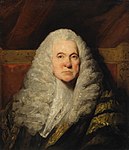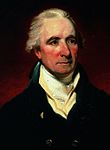All 300 seats in the House of Commons 151 seats needed for a majority | ||||||||||||||||
|---|---|---|---|---|---|---|---|---|---|---|---|---|---|---|---|---|
| ||||||||||||||||
General elections were held in the Kingdom of Ireland in 1783, the first after the passing of the series of constitutional legal changes known as the Constitution of 1782, which lifted the substantial legal restrictions on the Irish parliament. The elections were fought in a highly charged political atmosphere, with a major emphasis on the issues of parliamentary reform and free trade.[1]
Following the election, Sexton Pery was re-elected Speaker. Henry Grattan, the leader of the Patriot Party, had rejected an office in government in 1782, choosing instead to continue his role in opposition. Instead, the Dublin Castle administration was undertaken by a group that was referred to by Edmund Burke as the Junta; dominated by individuals such as John FitzGibbon, the new Attorney General and later Lord Chancellor. John Foster was appointed as the Junta's Chancellor of the Exchequer, succeeding William Gerard Hamilton, who had treated the position as a sinecure posting.[2] The new administration prioritised links with Great Britain, which from December 1783 was governed by Pitt the Younger.
- ^ Coyle, Eugene A. (1991). "County Dublin Elections (1790)". Dublin Historical Record. 44 (2): 13–24. JSTOR 30100983.
- ^ Ireland: A History from the Twelfth Century to the Present Day p.75

